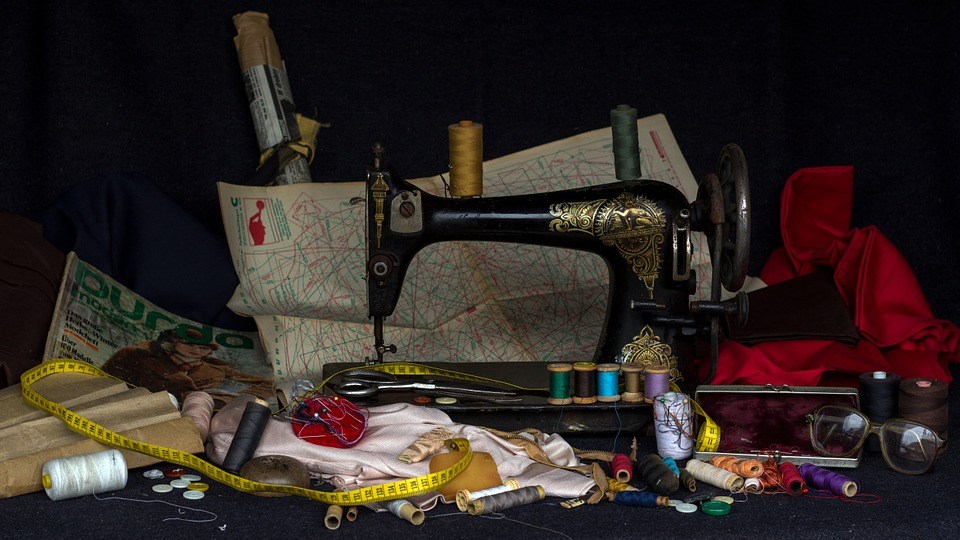It can be daunting to take up a new skill like sewing, especially if you’re not sure you have the right materials.
Perhaps you already have a sewing machine or are thinking about getting one, and are asking yourself, what do I need to start sewing?

Here are all the sewing machine accessories you need when you first get started.
Get Started with Sewing: The Essentials
Although it’s generally always a good idea to have a fairly well rounded sewing machine toolkit, there are a few things you simply can’t get by without, either as a novice or an experienced sewer. Here is what you absolutely must have before getting started.
The Right Sewing Machine
This one might seem like it should go without saying, but with so many different types of machines on the market right now, it can be easy to choose one you’ll regret later.
As a beginner, we recommend sticking to a basic 12-stitch model. As long as it can handle a straight stitch and a zigzag stitch, you’ll be able to learn on it.
Take a look at our recommended best sewing machines for inspiration and comparison reviews.
Fabric
This is another thing you shouldn’t over think when you’re first starting out. Be sure to consider the weight, stretch, and fiber content of the material before buying it, but don’t be too tempted by expensive, luxury fabrics.
We suggest sticking with cotton for your first few projects.
Thread
As a beginner, you should choose a basic, easily visible thread to work with.
Keep an extra spool or two on hand, just in case, and remember that your machine will be using two threads at once: the top thread and the bobbin thread.
Bobbins
These are an important part of your sewing machine. A bobbin is a small spool that you will need to thread and load into the machine.
The bobbin thread works together with the top thread to create the loops that become stitches. Bobbins are small and can be easy to misplace, so it’s a good idea to keep some extras around, but make sure you are buying the specific kind of bobbin that your sewing machine requires, or they may cause problems with the machine or not work.
In most cases, you will be able to find the ones you need online or in craft stores.
Needles
You will need both hand-sewing needles and sewing machine needles, and lots of each when you get started sewing with a machine.
Most experienced sewers recommend replacing your sewing machine needle with each new project you make, as they tend to get dull with use.
You will also need to do a bit of research about which sewing machine needle is best for the fabric you’re working with; the heavier the material, the larger the sewing machine needle you’ll need. In terms of the needle tip, however, a universal one should serve you well for your first few projects, at least.
Scissors
Every sewer must invest in a pair of sharp, good quality fabric sheers. Be careful that they’re never used on paper or cardboard though, or they will dull.
Tape Measure
This is one of those sewing machine essentials that can be easy to overlook if you are a beginner and eager to get started, especially if you already have other measuring tools on hand, such as a ruler.
However, sewing frequently involves measuring large, three-dimensional surfaces, so you’ll most likely find a tape measure to be necessary sooner rather than later.
Other Important Things
Now that we’ve covered the necessities, here are some other sewing machine accessories that will make your life as a sewer much easier.
The more you use your sewing machine, the more these are likely to become essentials as well.
Iron and Ironing Board
Ironing and pressing your materials before and after using them to sew with will help prevent inaccuracies and make your final product look more polished.
You can use either a standard iron or ironing board, or buy small and portable ones that are specifically designed for sewing and other crafts.
Pins
Yes, it is possible to sew without pins, but unless you have quite a bit of practice, it will be much more difficult and you won’t have the same precision that you would if you used them.
First and foremost, make sure you purchase pins that will be easily found if they fall on the floor.
It’s also helpful to invest in ones with glass, rather than plastic tops, so that they won’t melt if they come in contact with the iron.
Fabric Pens or Pencils
In all likelihood, you won’t be wanting to mark up your fabric with permanent ink, however most patterns will require you to mark it in some way. Fabric pens or pencils will wash out easily once your item is finished.
Painter’s Tape
Many beginners find it helpful to stick a strip of painter’s tape to the throat plate of their sewing machine in order to create a straight line to move the fabric along.
This helps to create perfectly straight seams, especially for less experienced sewers.
What do I need to start sewing? Now you know!
